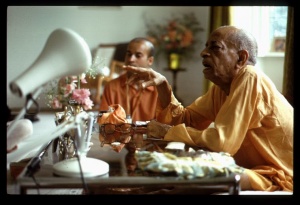CC Madhya 24.27: Difference between revisions
m (1 revision(s)) |
(No difference)
|
Revision as of 16:02, 20 March 2008

His Divine Grace
A.C. Bhaktivedanta Swami Prabhupada
A.C. Bhaktivedanta Swami Prabhupada
TEXT 27
’hetu’-śabde kahe—bhukti-ādi vāñchāntare
bhukti, siddhi, mukti—mukhya ei tina prakāre
SYNONYMS
hetu-śabde—by the word hetu; kahe—it is said; bhukti—enjoying the result by oneself; ādi—and so on; vāñchā-antare—because of a different ambition; bhukti—enjoying the result of action; siddhi—the perfection of doing something; mukti—liberation; mukhya—chief; ei—these; tina prakāre—in three ways.
TRANSLATION
“The word ‘hetu’ [‘cause’] means that a thing is done for some motive. There can be three motives. One may act to enjoy the result personally, to achieve some material perfection, or to attain liberation.